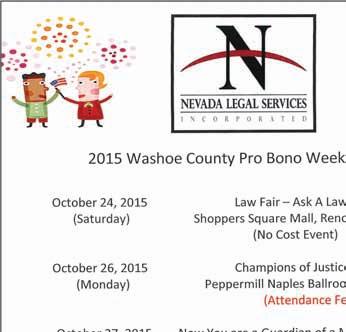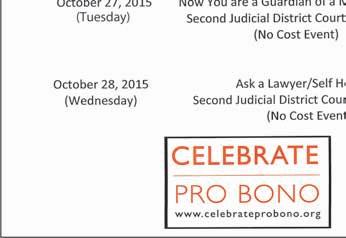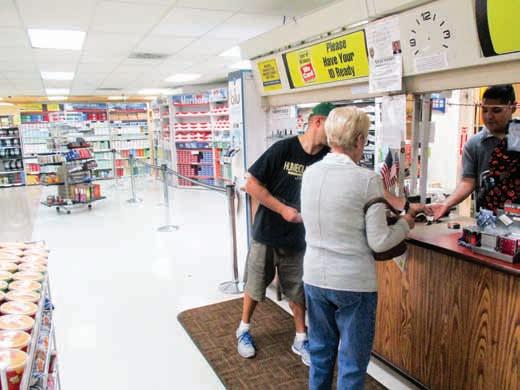
9 minute read
News
from Oct. 22, 2015
Reiding the riot act
Every time a presidential election year starts drawing near, Iowa and New Hampshire become sensitive to slighting comments about their privileged first-in-the-nation status, caucuses in Iowa and a primary in New Hampshire.
Advertisement
Last week, was U.S. Sen. Harry Reid who got their hackles up. Nevada has third-overall-in-the-nation status with its caucuses, followed by the South Carolina primary in fourth place.
It started at a Washington Post event where Reid said, “I have been a student of government for a long, long time, and I was always terribly upset about how we were choosing our presidents. You go to New Hampshire. There aren’t any minorities there. Nobody lives there. You go to Iowa, and there are a few people there. But again, it is a place that does not demonstrate what America is all about, for a lot of different reasons. Nevada does that. We are a state that has represented what America’s all about. And I think that bringing in South Carolina, bringing in Nevada, makes a better process for choosing a president.”
That prompted the New Hampshire Union Leader to begin its coverage with this lead: “Nevada, land of casinos and legal prostitution, ‘demonstrates what America is all about’ more than the first-in-the-nation primary state, Senate Democratic Leader Harry Reid said Monday night.”
Gov. Maggie Hassan provided a quote for the story: “Senator Reid’s disparaging comments about New Hampshire are as insulting as they are wrong, and an apology would certainly be appropriate. Our first-in-the-nation primary is a cherished responsibility for Granite Staters—a responsibility we hold because we invented it, and because we do it exceptionally well. I will always fight alongside Secretary [of State William] Gardner to protect the New Hampshire primary.” (In the Union Leader, the words in the phrase “first in the nation” were capitalized, sort of the way the San Francisco Chronicle describes its city as The City, and USA Today shoehorns the USA acronym into every story it can.)
The fever rose a little more when New Hampshire Republican chair Jennifer Horn offered advice to the Democratic governor, who is running for U.S. Senate after being recruited by Reid. “The governor should immediately demand that Harry Reid remove his ads supporting her candidacy and tell his Washington political machine to stay out of our Senate race,” Horn said in a prepared statement. “The importance of New Hampshire’s first-in-the-nation presidential primary goes beyond politics, and Governor Hassan’s continued reliance on his political support to advance her career says more than her transparent and politically-motivated call for an apology.”
In Las Vegas before the Democratic presidential debate, Reid responded: “New Hampshire is heavily populated and loaded with a lot of minorities,” he said to laughter from reporters. “My apologies.”
As an apology, that rang something less than sincere and prompted Iowa to be heard from, in the form of a Des Moines Register story—one that lacked the Union Leader’s home state chauvinism.
“I just said there aren’t many minorities in Iowa,” Reid told the newspaper.
“I’m satisfied with [Iowa going first],” he added.
The newspaper sought a better sense of what he felt about Iowa going first, and he replied, “We can’t change that. I just think it’s important that there be four involved—not just Iowa and New Hampshire, because I don’t think New Hampshire and Iowa are representative of America.”
There was one bit of actual news in all this—a Freudian pause when Reid was discussing what will happen in the 2016 election. At one point, Reid said that Nevada would be “a heavily Democratic state for us come Hillary time—or, whoever wins the primary.”
—Dennis Myers
Customers make a purchase at the Reno Sparks Indian Colony smoke shop.
If the price is right
Nevada courts a cigarette black market
Nevada may be feeling the impact of a dollar-a-pack hike in cigarette by taxes enacted by the 2015 legisDennis Myers lature that took effect on July 1. Some stores report sales have declined. “Ours were down 15 percent,” said Reno Sparks Indian Colony business enterprise director Steve Moran. “In California, it’s about 10 dollars [per carton] less than here,” he said. “In California, the tax is $8.70 per carton. Here it’s $18 per carton.”
Thomas Cargill Economist
A customer at the Colony store said, “I’m here because I didn’t have time to run out to Verdi,” a reference to sales at locations just the other side of the California state line on Interstate 80 where less expensive cigarettes can be purchased. There are also such sales north of Reno on U.S. 395 in California.
But California may also be riding to the rescue. An initiative petition has been filed in that state to raise the cigarette tax per carton by a whopping $20.
In January, Gov. Brian Sandoval asked the Nevada Legislature for a 40 cents per pack tax increase. The lawmakers saw that hike and raised him another 60 cents. The dollar per pack was predicted to raise $192 million in revenue, though some libertarian sources have predicted it will depress sales and erase or reduce the revenue gain. The increase took Nevada from 38th in the nation in cigarette taxes to 18th.
At the time, there were predictions of contraband cigarette sales likely if the tax was approved. The Jeffersonian Project—an arm of the American Legislative Exchange Council (ALEC)—argued, “While Nevada’s cigarette tax is lower than some of its neighbors, neighboring Idaho still levies a more competitive tax rate on cigarettes. If the tax on a pack of cigarettes were to be increased by 50 percent, Nevada would have a higher tax on cigarettes than neighboring California as well. ... If the state increases taxes, there is a strong incentive to purchase tobacco from out of state or black market sellers and traditional cigarette sales will be dramatically reduced, resulting in lackluster revenue collections.”
By contrast, people in health fields expressed the hope that the higher tax would get people to stop smoking—and prevent others from taking up the habit.
“The $1 per pack cigarette tax increase signed into law late Tuesday by Gov. Brian Sandoval will help to discourage tobacco use and save lives from cancer and other serious tobaccorelated diseases in Nevada,” said Christoper Hansen of the American Cancer Society. “Research shows that regular and significant tobacco tax increases are one of the most effective ways to encourage tobacco users to quit and protect young people from becoming addicted.”
Moran says people shopping at the Colony have made comments on the higher price. “Some say they are cutting down,” he said. “Some say they’re quitting. Some switching to cigars.”
A black market or other means of avoiding the full price would not only reduce state revenue, but it would reduce the take from the national tobacco settlement to which Nevada is a signatory. Those funds of of $5.49 to $5.60 per carton are used mostly for health care services and the Millennium Scholarships.
Two years ago, the Tax Foundation in D.C. released a study of “smuggled” cigarettes—those transported from low tax to higher tax states for sale—in the states. With Nevada’s per pack state tax then at 80 cents, the Foundation found that more cigarettes were being smuggled out than in—the outbound smuggled rate was 16.8 percent. No more current figures are available since the Nevada tax hike took effect, but it is likely to have reduced that rate.
At the time, some of those cigarettes smuggled out of Nevada may well have been headed for neighboring Arizona, with a $2 a pack state tax rate, one of the highest in the region. The Tax Foundation found that most cigarettes consumed in Arizona—51.5 percent—were smuggled in, second in the nation only to New York, a demonstration of the contraband impact higher tax rates can have.
Packs of cigarettes sold in Nevada must each bear a state revenue stamp. Chapter 370 of Nevada Revised Statutes addresses black market, counterfeit, and smuggled cigarettes, known legally as contraband.
Golden State/Silver State
University of Nevada, Reno economist Thomas Cargill described the process that activates a black market.
“There is a market price for a pack of cigarettes of, say, $2 per pack,” Cargill said in an email message. “The government adds $2 in taxes, so the ‘official price’ is now $4. This provides an incentive to provide cigarettes at the unofficial price. The higher the official price,
the greater the incentive to engage in black market activity. Government then attempts to regulate black market activity by imposing ‘costs’ such as going to jail if one is caught, etc. In the case of [alcohol] prohibition, the official price was essentially infinity while the unofficial market price was considerably less—hence, bathtub gin.”
When does it happen?
The California initiative petition, announced in May but not filed until early this month, would raise cigarette taxes by $2-a-pack. The money generated would be used for treatment, research and prevention of cancer and tobacco related diseases. There are two versions being circulated for signatures.
Whether they will make it onto the ballot depends on more than whether the signatures are obtained. The initiative drive is apparently intended to put pressure on the California Legislature, where several anti-smoking bills this year have been shelved. Measures to raise tobacco taxes, curb marketing, and define electronic cigarettes as tobacco products have been shunted aside by the California Assembly’s Governmental Organization Committee, many of whose members have been recipients of substantial tobacco money.
The initiative was filed by the Save Lives California Coalition, made up of health organizations like the California Medical Association, American Heart Association, American Lung Association in California, the American Cancer Society Cancer Action Network, California Dental Association, Tobacco Free Kids and Health Access California, plus the Service Employees International Union of California. It is being supported also by billionaire hedge fund manager Tom Steyer, a sort of liberal Koch.
If the initiative drive succeeds in reviving any of those measures— such as Sen. Richard Pan’s $2 a pack bill—the initiatives would no longer be necessary. A tax hike by either method would have the same impact on Nevada, though the initiative route would take longer. Ω
Steve Moran Reno Sparks Indian Colony
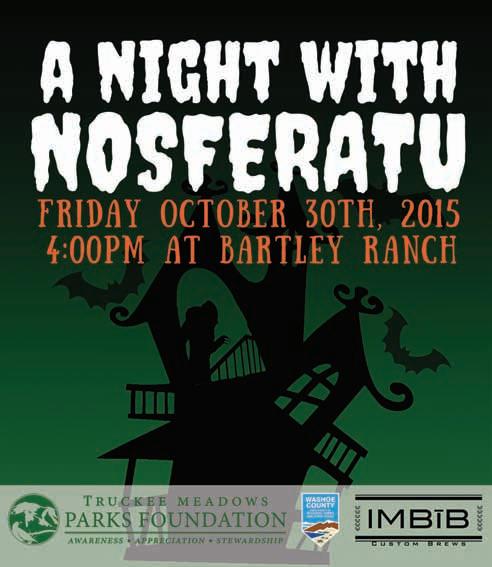
Change
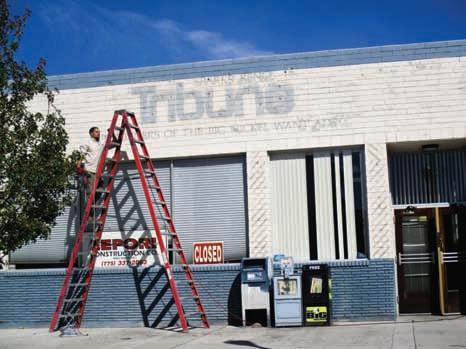
A worker does prep work on the former Sparks Tribune building, which started out in life as the Sparks Post Office. The Trib has now moved out of the downtown to Glendale Road and its former home is being retooled into a printing company. The faint image of the Tribune name on the wall here has been painted out since the photo was taken.
MOVIE SCREENING & LIVE SCORE AT 6:30PM
CARNIVAL GAMES FACE PAINTING PHOTOBOOTH PUMPKIN DECORATING FOOD TRUCKS RAFFLE PRIZES COSTUME CONTESTS LIVE MUSIC
$8 in advance at our website
$10 at the door Kids 12 and under are free
For tickets, visit our website at tmparksfoundation.org
All proceeds will go towards funding the 2016 TMPF Summer Camp
